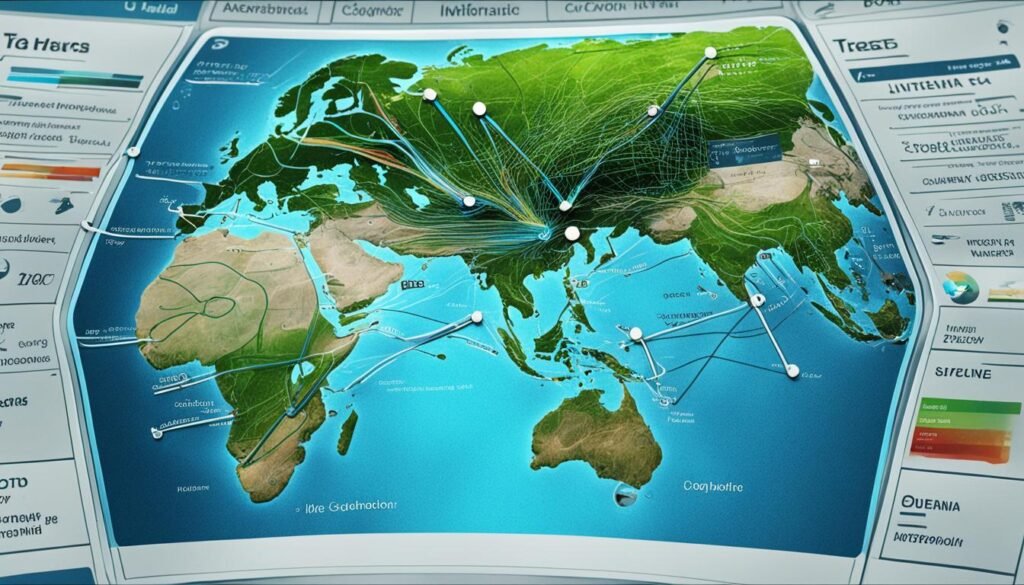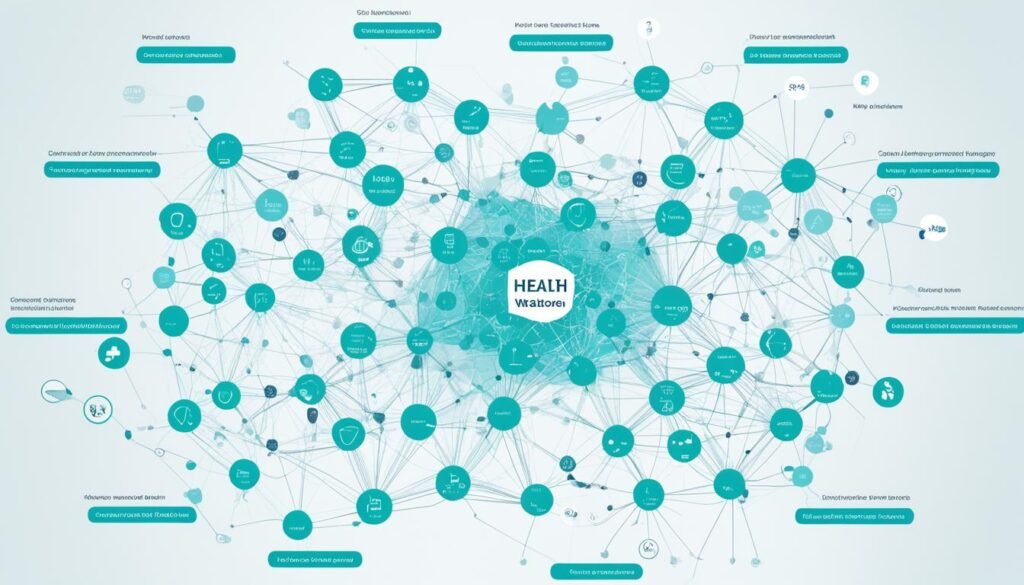Data Monetization’s has become a key asset for businesses. Companies now see the chance to make money from their data. This is done through both using data inside the company and selling it to others.
Internal data monetization means using data to make better business choices. This leads to real improvements. External data monetization is about making a product from the data and selling it to others.
Every industry has its own way of making money from data. From music to healthcare, companies are finding new ways to use their data. They offer solutions that are based on data to customers and partners.
Key Takeaways
- Data monetization is the process of generating revenue or economic value from data assets.
- Organizations can pursue internal data monetization by using data to improve business decisions and external data monetization by creating data-driven products and services.
- Different industries are adopting unique approaches to data monetization, leveraging their specific data sources and capabilities.
- Successful data monetization strategies require a deep understanding of the value of data, effective data management, and compliance with data protection regulations.
- Data monetization is a critical component of a comprehensive data strategy and can contribute to a company’s overall business success.
What is Data Monetization’s?
Data monetization is about making money from data. Companies use their own data to make better decisions and work more efficiently. They can also sell their data to others, which is called external data monetization.
Internal Data Monetization
Using data and analytics helps companies improve. They can make better marketing and give customers what they want. This way, they make more money and spend less.
External Data Monetization
External data monetization means selling data products or services. Companies can sell raw data, insights, or apps online. They make money by licensing data or creating new products.
| Data Monetization Examples | Data Monetization Use Cases |
|---|---|
|
|
“Data is the new oil, and like oil, it needs to be refined before it can be useful.”
Why is Data Monetization Critical for Business Strategy?

In today’s world, data monetization is key to a winning business plan. A McKinsey study shows it’s a big factor in making companies stand out. It’s easier than ever to start data monetization, letting businesses offer top-notch products or make smarter choices.
Data monetization is vital for transforming businesses, creating new income, and staying ahead. By using data wisely, companies can unlock their data’s true worth. This keeps them ahead of rivals.
The benefits of data monetization include:
- Better data-driven decision making and data-driven transformation
- New ways to make money with data-based products and services
- Being more competitive by using data as a strategic asset
As data monetization trends grow, companies focusing on this strategy will gain from their data’s value. They’ll beat their competitors.
“Data is the new oil, and analytics is the combustion engine.”
| Key Factors | Impact on Business Strategy |
|---|---|
| Data Monetization Strategy | Drives transformation and generates new revenue streams |
| Data-Driven Decision Making | Enables more informed, strategic decisions |
| Data as a Strategic Asset | Provides a competitive advantage through data-based products and services |
Data Monetization in the Music Industry

The music industry has changed a lot, becoming very data-driven. Now, making money from data is key for record labels and streaming platforms. They use data to find important insights that help them make business decisions and grow.
Spotify is a great example. It’s the top music streaming service in the world. Spotify uses data to make music recommendations for its users. This has helped streaming become the top way people listen to music.
Record labels also benefit from data monetization. They can find new fans and market to them better. By knowing what listeners like, they can plan their releases and marketing better. They can even create new products and services for the music industry.
This new way of thinking has changed the music industry. Companies can now make better decisions and find new ways to make money. As the industry keeps changing, using data to make money will be even more important for the music world.
| Key Benefits of Data Monetization in the Music Industry |
|---|
|
“Data monetization has transformed the music industry, enabling companies to make informed decisions and unlock new revenue streams.”
Data Monetization in the Automotive Industry

The automotive industry is now using data to get ahead. By tapping into the data from connected and self-driving cars, companies can find new ways to innovate and improve the customer experience.
Tesla’s Data-Driven Approach
Tesla leads in using data to drive its business. This electric car maker gathers a lot of data from its cars, like how they perform, how drivers act, and the environment they’re in. Tesla uses this data to make its cars safer, more efficient, and better for users.
A 2020 study by McKinsey & Company found that 37% of consumers would switch to a car brand that offers better connectivity. This shows how crucial data use is in the car industry. Companies that use and make money from their data will be ready for today’s tech-savvy buyers.
Data monetization is key for a winning car strategy. It helps in making marketing more personal and informs the design of new cars. By making the most of their data, car makers can innovate, keep customers coming back, and stay ahead in the game.
Data Monetization in Retail

Data monetization has changed the game in retail. Retailers use customer data to get deep insights and make smart business choices. They analyze customer behavior and what they buy to improve their products, manage stock better, and make marketing more effective.
Amazon is a top example of how data helps in retail. It knows a lot about what people buy, when, and why. This info helps Amazon make smart choices about what products to sell, how much to charge, and how to please customers, leading to more sales and happier customers.
True Fit is another company making the most of data in retail. It uses customer data to ensure clothes and shoes fit perfectly, cutting down on returns. By offering size and fit advice, True Fit has changed online shopping, making customers more loyal and boosting sales for its retail partners.
| Retail Data Monetization Strategies | Benefits |
|---|---|
| Customer Data Monetization | Improved customer segmentation, targeted marketing, and personalized product recommendations |
| Inventory Data Monetization | Optimized inventory management, reduced stockouts, and efficient supply chain operations |
| Retail Data Products and Services | Monetization of data-driven insights and analytics offerings for other businesses |
Data monetization is key to staying ahead in retail as the industry changes. It helps retailers find new ways to make money, improve customer experiences, and grow their businesses over time.
Data Monetization in Healthcare

Data monetization is key in healthcare today. It helps improve patient care and drive new ideas. Companies like IBM Watson Health use healthcare data to offer personalized care and support medical research.
IBM Watson Health’s Data-Driven Solutions
IBM Watson Health is a top name in healthcare data use. It offers tools that help healthcare groups make the most of their data. This leads to smarter decisions and smoother operations.
- Patient Data Monetization: IBM Watson Health’s tools help doctors understand their patients better. This means patients get care that fits their needs, leading to better health.
- Medical Device Data Monetization: IBM Watson Health uses data from devices to help doctors make better choices. It also lets doctors keep an eye on patients’ health as it changes.
- Disease Data Monetization: IBM Watson Health’s tools spot patterns in diseases. This helps health groups act early to stop outbreaks and treat diseases more effectively.
IBM Watson Health is changing how healthcare uses data for the better. It’s leading the shift to a data-driven healthcare world.
“Data monetization is essential for healthcare today. Companies like IBM Watson Health are unlocking healthcare data’s value. This leads to better patient care and faster medical advances.”
Data Monetization in Marketing

In marketing, using data to make money is a big chance for businesses to stand out. By using customer data and advanced analytics, marketers can make campaigns that really speak to people. These campaigns are made just for each person’s likes and actions.
This way, marketers can learn a lot about their customers. They can see what they buy and what they might want next. This helps with big decisions, like making new products or improving ads. Companies like Apple lead the way by using data to send special content and deals to customers.
| Key Benefits of Data Monetization in Marketing | Examples |
|---|---|
|
|
As more decisions are made with data, marketers who use data monetization marketing will lead. They will give amazing experiences to customers.
Opportunities for Internal and External Data Monetization

Today, businesses have a treasure trove of untapped data. This data offers many chances to make money both inside and outside the company. By using these insights, companies can boost their own work and start new ways to make money and work together.
Inside, data helps make better decisions, improve customer experiences, and find new ways to sell more. Companies can dive deep into their data to understand their work better. This helps them make smarter choices and find ways to work more efficiently.
Outside, companies can turn their data into something valuable. They can sell things like reports on industry trends, how customers behave, or forecast data. This way, they can make new money streams. Working together, companies can also create new partnerships and models based on sharing data for everyone’s gain.
| Internal Data Monetization Opportunities | External Data Monetization Opportunities |
|---|---|
|
|
By looking at both internal data monetization opportunities and external data monetization opportunities, companies can fully use their data. This gives them an edge in their fields.
“Data is the new oil, and the companies that learn how to extract value from it will be the ones that thrive in the 21st century.”
Best Practices for Getting Started with Data Monetization

To make the most of data monetization, companies need to follow key steps. First, they must figure out how much their data is worth. They should check if there’s a market for it and if the costs can be covered by the revenue made.
Keeping data quality high is also key. Companies should focus on data governance, security, and following the law. This keeps their data trusted and valuable.
Quantifying Data Value and Managing Data Quality
Here are some best practices for data monetization:
- Data Valuation: Do deep assessments to find out how much the data is worth and what revenue it can bring in.
- Data Quality Management: Use strong data quality steps, like cleaning, normalizing, and enriching, to make sure the data is right, full, and trustworthy.
- Data Governance: Set up clear rules for who owns, gets to see, and uses the data. Make sure it follows the law and industry rules.
- Data Security: Use strong security steps to keep sensitive info safe and gain trust from customers and partners.
Also, check if your tech can handle your data monetization plans. Be ready to buy new tools and infrastructure if needed. Having everyone in the company on board and having product owners focused on data monetization is also key to success.
“By following these best practices, businesses can unlock the full potential of their data assets and generate new revenue streams.”
Also Read: How Do Websites Generate Income?
Conclusion
Data monetization is now key for businesses in many fields. Companies see the value in their data and use it to make more money, improve customer experiences, and stay ahead. This new approach has changed how companies work, making data a key asset for growth and innovation.
The future looks bright for data monetization, with more demand for data-driven solutions. By using data well, companies can grow and help the data-driven economy. This shift offers big chances for success.
As data monetization grows in importance, businesses must use their data wisely. They need to understand its value, keep it clean, and have strong plans for making money from it. Doing this will help companies use their data fully and lead in their fields. The future of data monetization is promising, and those who act on it will gain a big edge.
FAQs
Q: What is data monetization and how do different industries approach it?
A: Data monetization refers to the process of generating revenue or deriving value from data assets. Different industries approach data monetization by identifying various use cases such as offering data as a service, creating data products, implementing data marketplaces, or selling data to other businesses.
Q: What are some common use cases for data monetization?
A: Some common use cases for data monetization include leveraging customer data for targeted marketing, selling aggregated data to third-party companies, offering data analytics services, and creating data-driven products or services.
Q: How can organizations effectively manage their data to maximize monetization opportunities?
A: Organizations can effectively manage their data by implementing robust data management practices, ensuring data quality and accuracy, utilizing synthetic data for testing purposes, and developing a data strategy that aligns with their monetization goals.
Q: What are some examples of data that can be monetized by businesses?
A: Examples of data that can be monetized by businesses include customer demographic information, purchasing behavior data, website traffic analytics, sensor data from IoT devices, social media interactions, and financial transaction data.
Q: How do businesses protect the valuable data associated with their monetization initiatives?
A: Businesses protect the valuable data associated with their monetization initiatives by implementing data protection measures such as encryption, access controls, data anonymization techniques, and compliance with data privacy regulations.
Q: What role does big data play in the data monetization process?
A: Big data plays a significant role in the data monetization process by providing organizations with large volumes of diverse data sources that can be analyzed to uncover valuable insights, identify trends, and discover new monetization opportunities.
Q: How do companies leverage data as a service in their data monetization strategies?
A: Companies leverage data as a service by offering access to their data assets on a subscription basis, allowing other businesses to use the data for various purposes such as market research, predictive analytics, or product development in exchange for a fee.
Source Links
- https://www.analytics8.com/blog/data-monetization-how-to-do-it-so-you-can-get-more-value-out-of-your-data/
- https://www.linkedin.com/pulse/industries-data-monetization-can-transform-arek-skuza
- https://www.stibosystems.com/blog/a-data-monetization-strategy-get-more-value-from-your-master-data





